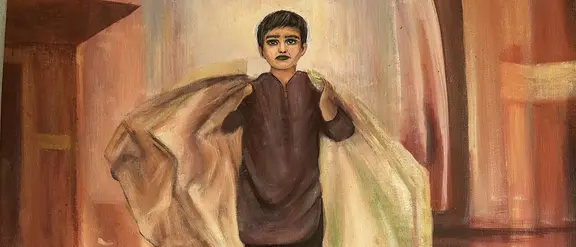Imran was born in Herat and grew up with his parents and younger brother. His father was an officer in the Afghan army. Imran's walk to school was dangerous, as schools were frequently attacked: explosives, gunfire, tear gas, poisoned food. Once, when Imran was eleven, he witnessed a suicide bombing outside a mosque after school: "There were body parts everywhere. A man and his child burned to death in the car – I heard them screaming."
His father also became a target of the Taliban. During an operation, the military convoy was attacked: "Some of his colleagues were killed. My father was shot in the leg. Since then, he hasn't been able to walk properly."
Imran's father came under increasing pressure in the neighborhood: some neighbors demanded weapons – he knew they sympathized with the Taliban. When he refused, they threatened to hand him over to the Taliban. The more territory the Taliban conquered, the greater the fear of reprisals became – many of the neighbors joined the Taliban themselves.
With the fall of the government in August 2021, the situation deteriorated dramatically. When the Taliban invaded Herat, his father wanted to fight, but his mother held him back. “We panicked. We didn’t know what was happening. We were afraid of dying.” His father burned his documents. Two days later, the Taliban began searching houses for former soldiers and opposition members. “We knew we had to leave immediately.”
They fled to Iran. The situation for Afghan refugees there was catastrophic – poverty, exploitation, and deportations. For Imran, deportation would have been life-threatening: “My father’s enemies would have handed me over to the Taliban. They would have imprisoned and tortured me. They would have abused and enslaved me.”
The 16-year-old tried to escape alone. To finance his escape, the family sold an inherited house and hired a smuggler. "Everyone cried when we said goodbye. Even my father. We didn't know if we would ever see each other again."
The journey to Turkey involved days of walking over mountains, under the constant threat of smugglers. "Anyone who refused to go any further was beaten. That included women and children. Young girls were sometimes raped by the smugglers." Imran was arrested ten times, beaten, and deported back to Iran. He finally made it to Istanbul. There, he lived for three months, sometimes homeless and in great uncertainty. "If the police catch you, you're deported to Afghanistan."
From Iran, his father organized his escape to Greece, selling his mother's gold jewelry. The smuggler gave him a small boat. "I saw corpses floating in the water. I thought we were going to drown, too." From Greece, he made his way through North Macedonia to Serbia – but there, border police caught him and took his last money. "Then they kicked me and said if I didn't leave, they would shoot me."
His second attempt to enter Serbia also ended in a pushback – Serbian police beat him for ten minutes and sprayed pepper spray in his eyes. "I couldn't see anything, but they kept hitting me." The third time, they kicked him until he bled and set dogs on him. "They didn't act like human beings. I begged them, but they didn't care that I was just a child."
He finally managed to cross the border, traveling through Hungary, crammed into a van, until he reached Austria and finally Germany. There, at the age of 16, he was placed in a clearinghouse. The age assessment was delayed for months: "They simply said I was over 18."
He was transferred to a camp and shared a room with three adults. Only with legal assistance was he able to initiate a new age assessment. This finally confirmed his minority. At last, he gained access to education. "For the first time, I had a tiny bit of hope. But to this day, I ask myself: Why was I denied the chance to learn for over a year?"
The family's situation in Iran is hopeless: their visas have expired and their lease is about to end. The father works as a day laborer in construction. Escape is too expensive and too dangerous. "Every day is dominated by the fear of deportation. They would kill my father. And my mother and little brother would be defenseless against the Taliban."
He thinks a lot about his traumatic escape – and about the countless people who do not survive the escape: "Their bodies are found somewhere at the borders, some simply disappear."
